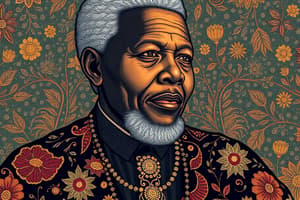Podcast
Questions and Answers
What does the 8th Habit focus on in leadership?
What does the 8th Habit focus on in leadership?
- Understanding the whole person and their potential (correct)
- Maintaining strict order and hierarchy among employees
- Assigning tasks based on individual roles only
- Making decisions solely from the top management
How does modeling influence trust among individuals?
How does modeling influence trust among individuals?
- It generates trust through rigid authority
- It requires constant validation from others
- It strengthens competition between team members
- It inspires trust without expecting anything in return (correct)
What is a characteristic of organizations stuck in the mindset of the Industrial Age?
What is a characteristic of organizations stuck in the mindset of the Industrial Age?
- They prioritize flexibility and innovation
- They typically overlook their underlying problems (correct)
- They have extensive employee participation in decisions
- They empower individual contributions from all levels
Which action is integral to the role of pathfinding in leadership?
Which action is integral to the role of pathfinding in leadership?
What does the ‘sweet spot’ refer to in the context of the 8th Habit?
What does the ‘sweet spot’ refer to in the context of the 8th Habit?
What is primarily produced by the process of aligning within an organization?
What is primarily produced by the process of aligning within an organization?
Which role of leadership focuses on deciding higher-priority goals and values?
Which role of leadership focuses on deciding higher-priority goals and values?
What is the relationship between focus and execution in effective leadership?
What is the relationship between focus and execution in effective leadership?
What does empowering as a leadership role unleash within individuals and teams?
What does empowering as a leadership role unleash within individuals and teams?
According to the content, what is a significant missing link in most organizations regarding their strategies?
According to the content, what is a significant missing link in most organizations regarding their strategies?
What is the primary reason organizations should focus on wildly important goals?
What is the primary reason organizations should focus on wildly important goals?
What does the Stakeholder Screen help organizations assess?
What does the Stakeholder Screen help organizations assess?
According to the Importance Screen, what factors should goals consider?
According to the Importance Screen, what factors should goals consider?
What effect does keeping score have on performance in organizations?
What effect does keeping score have on performance in organizations?
What is the likely outcome of attempting to focus on too many goals simultaneously?
What is the likely outcome of attempting to focus on too many goals simultaneously?
What is considered more beneficial for leaders than a superb strategy?
What is considered more beneficial for leaders than a superb strategy?
Which of the following is NOT one of the six core drivers to execution in an organization?
Which of the following is NOT one of the six core drivers to execution in an organization?
What typically causes breakdowns in execution?
What typically causes breakdowns in execution?
How does the Industrial Age approach to commitment differ from the Knowledge Worker Age?
How does the Industrial Age approach to commitment differ from the Knowledge Worker Age?
According to the content, what happens when clarity and commitment are lacking within an organization?
According to the content, what happens when clarity and commitment are lacking within an organization?
What is a common misconception about motivating Knowledge Workers?
What is a common misconception about motivating Knowledge Workers?
What does Peter Drucker imply about management in relation to execution?
What does Peter Drucker imply about management in relation to execution?
What is the focus of the Knowledge Worker Age compared to the Industrial Age?
What is the focus of the Knowledge Worker Age compared to the Industrial Age?
What is considered a major challenge in enabling teams within organizations?
What is considered a major challenge in enabling teams within organizations?
Which of the following best describes the term 'synergy' in the context of the Knowledge Worker Age?
Which of the following best describes the term 'synergy' in the context of the Knowledge Worker Age?
What does primary greatness focus on?
What does primary greatness focus on?
Which practice replaces 'carrot-and-stick' motivation in the Knowledge Worker Age?
Which practice replaces 'carrot-and-stick' motivation in the Knowledge Worker Age?
The 'sweet spot' in the context of personal, leadership, and organizational greatness refers to what?
The 'sweet spot' in the context of personal, leadership, and organizational greatness refers to what?
Which of the following is NOT one of the 4 Disciplines of Execution (4DX)?
Which of the following is NOT one of the 4 Disciplines of Execution (4DX)?
How does the perception of people change from the Industrial Age to the Knowledge Worker Age?
How does the perception of people change from the Industrial Age to the Knowledge Worker Age?
What role does emotional connection play in organizational effectiveness?
What role does emotional connection play in organizational effectiveness?
What is the primary outcome desired by practicing the 4 Disciplines of Execution?
What is the primary outcome desired by practicing the 4 Disciplines of Execution?
Flashcards are hidden until you start studying
Study Notes
The 8th Habit
- The 8th Habit is about finding your voice and inspiring others to find theirs.
- It acknowledges the whole person and unlocks the potential of the knowledge worker economy.
- The 8th Habit addresses the shortcomings of the Industrial Age "part-person" paradigm.
- It promotes a leadership approach that recognizes and values each individual's potential.
The Four Roles of Leadership
- Modeling: Creates trust, personal moral authority.
- Pathfinding: Creates order through shared decision-making, visionary moral authority.
- Aligning: Aligning structures and systems to support the vision, institutionalized moral authority.
- Empowering: Unleashes human potential through co-missioning processes, cultural moral authority.
The Central Concept: Focus and Execution
- Focus: Defining what matters most.
- Execution: Making it happen.
- Modeling and pathfinding contribute to focus.
- Aligning and empowering contribute to execution.
Importance of Execution
- Execution is the missing link between aspiration and results.
- Effective execution requires a commitment to clarity, commitment, translation, enabling, synergy, and accountability.
- Gaps in these six areas lead to execution breakdowns.
The Industrial Age vs. The Knowledge Worker Age
- Industrial Age: Command-and-control, hierarchical, transactional.
- Knowledge Worker Age: Whole-person approach, collaborative, transformational.
Overcoming Execution Gaps
- Clarity: Involve people in setting goals and priorities.
- Commitment: Create a culture of trust and respect, offer meaningful work.
- Translation: Align individual roles with team and organizational goals.
- Enabling: Remove dysfunctional structures and systems.
- Synergy: Foster collaboration and communication.
- Accountability: Implement open feedback and mutual accountability.
Achieving Greatness
- Personal Greatness: Discover and develop your three birth-gifts: choice, principles, and the four human intelligences.
- Leadership Greatness: Inspire others to find their voice by embodying the four roles of leadership.
- Organizational Greatness: Achieve alignment between leadership roles and work, prioritizing clarity, commitment, translation, enabling, synergy, and accountability.
The Sweet Spot
- The sweet spot is the intersection of personal, leadership, and organizational greatness.
- It represents the optimal state of power and potential.
The 4 Disciplines of Execution (4DX)
- 4DX is a framework for closing execution gaps.
- Focuses on the 20% of activities that produce 80% of results.
- 4DX is aligned with the three areas of greatness, highlighting the importance of personal, leadership, and organizational focus on achieving desired outcomes.
The 4 Disciplines of Execution
- The Sweet Spot, or 4DX, is a set of practices for consistent results
- Focus on the Wildly Important:
- People focus well on one thing at a time
- Multiple goals lead to decreased chances of achieving excellence
- Identify "Wildly Important Goals" (WIGs) with serious consequences for failure
- Importance Screen prioritizing by:
- Economic: Revenue growth, cost reduction, improved cash flow, Profitability
- Strategic: Mission alignment, core competency leveraging, market strength, and competitive advantage
- Stakeholder: Customer loyalty, employee engagement, favorable impact on suppliers, vendors, business partners, and investors
- WIGs should be determined by all levels of the organization
- Create a Compelling Scoreboard:
- People perform better when keeping score
- A Scoreboard makes it clear:
- From what?
- To what?
- By when?
- Creates a visible, dynamic, and accessible representation of progress
- Includes measures for principle-centered values
- Translate Lofty Goals into Specific Actions:
- The stated strategy is what's communicated, the real strategy is what people do
- Frontline workers need clear instructions on how goals are achieved
- Identify new behaviors needed to achieve goals and translate them into weekly and daily tasks
- Hold Each Other Accountable—All of the Time:
- Effective teams hold regular accountability sessions
- Triage Reporting prioritizes urgent issues
- Finding Third Alternatives involves brainstorming and creative dialogue
- Clearing the Path removes barriers to achieving goals
Institutionalizing Execution
- These 4 Disciplines can be practiced and replicated, leading to consistent execution
- The Execution Quotient (xQ) measures an organization's ability to focus and execute
- xQ evaluation measures the gap between setting a goal and achieving it
- Conducting xQ tests regularly (every 3-6 months) provides a picture of focus and execution
- Aligned organizational goals drive the achievement of strategic priorities
Finding Your Voice and Inspiring Others to Find Theirs
- The 8th Habit is about using the empowering knowledge worker model
- The 7 Habits, 4 Roles of Leadership, and 6 Principles of Execution are key to organizational greatness
Win-Win Agreement vs. 4 Disciplines
- The basic principles of a win-win agreement are the same as the 4 Disciplines
- Desired Results and Guidelines are embodied in WIGs and the Scoreboard
- Resources are implicit in translating lofty goals into specific actions
- Accountability and Consequences are explicit in holding each other accountable
- The 4 Disciplines approach focuses on the larger context of execution gaps and how the Knowledge Worker Age model bridges them.
Studying That Suits You
Use AI to generate personalized quizzes and flashcards to suit your learning preferences.




